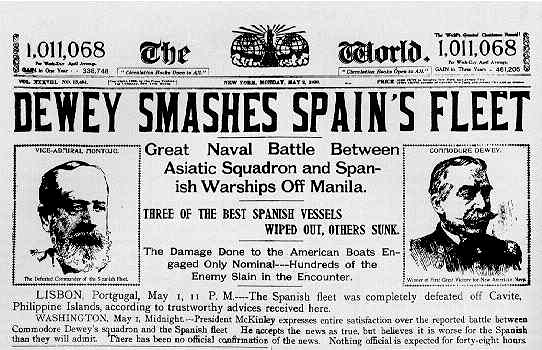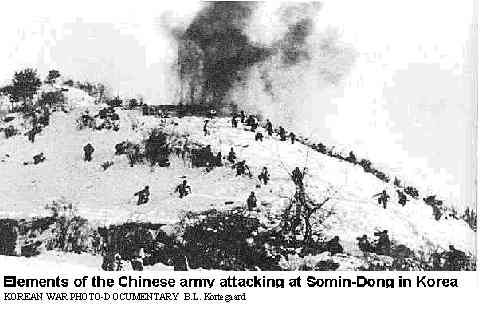Alternative Insight
The Challenge of Empire
A Clash of Civilizations?
President Bush's pronouncements that the war against terrorism has just begun, that the year 2002 will be a "year of war," the revocation of the ABM treaty and U.S. intentions of mounting anti-missile bases in Afghanistan portend additional offensive and defensive actions. Militarism is a driving force in the world's long-term future, pushing it towards continuous war. The global reaches of conflicts are reminiscent of the wars of ancient history--the clashes of civilizations.From Political Consolidations to Clashes of Civilizations
Empires throughout history have followed a familiar pattern--consolidation of territory, pacification of smaller neighboring antagonists, wars against competing nation-states and finally, with global reach, a clash of civilizationsFrom 1789 to 1900, the United States consolidated its
territory. The country fought wars against Indian tribes and Mexico to expand from coast-to-coast. Treaties and purchases of lands from France and Russia filled in the territorial gaps. At the same time, America pacified its neighbors with the Monroe Doctrine that placed all Western hemisphere countries under U.S. protection. In numerous wars the U.S. prevented Latin American nations from obtaining substantial economic or military power that could threaten its interests.
As the twentieth century emerged, the United States sought its Manifest Destiny by reaching out from its shores and expanding its territory. In the Spanish American War it acquired resources and naval bases for defense and refueling. In Panama it built a shipping link between the two oceans that commanded trade from East to West and vice-versa.
The two oceans physically isolated the U.S. from potential enemies. The economic dictates of the capitalist system demanded exports to sell surplus goods and imports to acquire raw materials. Germany in World War I and Germany together with Japan in WWII attempted to resolve the competition for resources and markets by engaging other powers in world wars. By joining Great Britain and France, whose political ideologies most resembled those of America, and winning two world wars, the U.S. entered the struggles characterized as wars of nation-states. After 1945, the U.S. could be considered a "world empire." It had physical and economic control over a vast portion of the world. It wasn't the only empire!
A "Godless" Communist Soviet Union had also emerged as a world empire. The equal military capabilities of the two empires and the threat of mutually assured destruction prevented a severe military clash. A Cold War sufficed to morally and economically impede the two antagonists until the social and economically weaker communist nation could no longer sustain the demands of the conflict. After 1990, the world had one empire whose political, military and economic power extended throughout the globe--the United States of America. Its success in the clash of empires ushered the U.S. into the arena of a clash of civilizations.
The Clash of Civilizations
Samuel P. Huntington, in his classic 1996 book, The Clash of Civilizations and the Remaking of the New World Order, popularized the phrase and thoughts of "the clash of civilizations." Huntington had already outlined his thesis in a scholarly journal:It is my hypothesis that the fundamental sources of conflict in this new world will not be primarily ideological or primarily economic. The great divisions among humankind and the dominating source of conflict will be cultural. Nation states will remain the most powerful actors in world affairs, but the principal conflicts of global politics will occur between nations and groups of different civilizations. The clash of civilizations will dominate global politics. The fault lines between civilizations will be the battle lines of the future.--Samuel P. Huntington, Foreign Affairs, Summer 1993.
The United States won the Cold War and became the most dominant world power in history. The dominance moved it inexorably into the situations of previous empires; fear of losing power, perceived threats from contending civilizations, squelching potential antagonists before they acquired power. Huntington explains it: "For peoples seeking identity and reinventing ethnicity, enemies are essential, and the potentially most dangerous enmities occur across the fault lines between the world's major civilizations." (Samuel P. Huntington, The Clash Of Civilizations, p.20) The post Cold War military adventures are beginning to resemble the wars of ancient history--wars of empires, such as those of Greece and Rome, whose armies moved North, South, East and West and fearlessly battled against other civilizations. The empire civilizations, such as those of the Arabs, Napoleon, Ottomans and 19th century Britain, extended as far as they could go, halted by overstretched supply lines and limited manpower. In the latest wars, the United States has developed strategies in which the supply lines have no limits and abundant manpower is no longer crucial to victory.
"The West won the world not by the superiority of its ideas or values or religion (to which few members of other civilizations were converted) but rather by its superiority in applying organized violence. Westerners often forget this fact; non-Westerners never do. (ibid, p.51)
It's not a coincidence that with the end of the Cold War, the United States found itself in conflict with Radical Islam.
Radical Islam and the Clash of Civilizations
Initially, the United States approached Radical Islam with enmity and a limited fear of its potential dangers. Radical Islam approached the United States with total fear and exaggerated views of America's intentions towards it. American power and exports carried with them American culture that Radical Islam regared as demonic and an avenue to bring Moslems into away from their attachment to Islam. If the Arab peoples decided to join the "winners" and adopt western attitudes, the power of the Mullahs would slowly shrink. American power would dominate and Islam would become weak. Radical Islam decided to engage the United States in a clash of civilizations.
U.S. military actions reinforced the radical Islamic beliefs. The continuous sanctions and aerial war against Iraq, the core military power of the Arab world,
indicated to some Arab leaders, such as former King Hussein of Jordan in 1990, that the U.S. would not permit an Arab country to gain significant military strength. Safar Al-Hawali, dean of Islamic studies at the Umm Al-Qura University in Mecca has been quoted as stating: "It is the West against Islam." Stationing of U.S. troops in Saudi Arabia and U.S. support of western oriented Israel against a defenseless Arab Palestinian people verified to the radical Islamic world that U.S. power would continually encroach upon and then strangle their world. Either unknowingly or uncaringly, American administrations fueled the development of Osama Bin Laden and his Al Queda organization. Despite awareness of Samuel P. Huntington's mid-1990's clairvoyant predictions, the United States could not modify its policies in order to prevent its involvement in a clash of civilizations. And the clashes will not end in the Mid-East world. The Asian continent forecasts another clash--a struggle with Chinese civilization.
China and the Clash of Civilizations
Knowing the consequences in a nuclear world, both China and the United States want to avoid confrontation. Yet, it might be unavoidable. History shows that the burden of empire carries with it the inexorable clash of civilizations.
China, which is a civilization that has its own dogmatic culture, is rapidly emerging as the central power of the oriental world. The Chinese civilzation consists of China, Taiwan, Hong Kong, Singapore and overseas Chinese communities throughout Southeast Asia. This 4000 year old culture has maintained many of the ingredients of its incipient culture and is not inclined to change or permit an alien culture to interfere with its social and economic progress. The greater China has the finances, resources and manpower together with centralized controls to compete in almost any industry and with any nation. It has the potential to control a major portion of the world's export markets and determine much of the import markets. If America's future becomes dependent on China's initiatives, the American empire will lose its dominance. Before that happens, and while American power prevails, the U.S. must decide if it wants to retain dominance by a clash of civilizations or agree to forfeit its leading role. Wise empires make the fateful decision early in the competition game. That's how they remain empires.
A troubling aspect is that America's former foe, the Soviet Union, with whom the U.S. fought decades of a Cold War, was never an economic threat to the United States. China can be a major economic threat to the United States. It can compete for exports and flood the U.S. with imports. The Soviet Union, which included the East European countries, never sent its military across its empire's borders until its punishing invasion of neighboring Afghanistan. China has frequently sent its troops across its borders. It fought in the Korean War, invaded and incorporated Tibet and has had military confrontations with India, Vietnam and the Soviet Union. If Washington's strategists favored extremely aggressive policies with a militarily powerful Soviet Union, would they remain accommodating with a more challenging but less powerful China? America constantly seeks military bases along the Pacific rim and now has troops available in Afghanistan that has a small border with China. China must feel threatened.The friction points between the two countries have moved closer. The buffers are shrinking.
Considering the circumstances of the battle, the U.S. could have probably reached an accommodation with Communist Russia early in their struggle by trading a halt in Soviet global reaches for a halt in America's global ambitions. Considering the circumstances of America's economic and military relations with communist China, it appears that the U.S. might have a greater problem in achieving a satisfactory agreement. One major problem is that the the U.S. empire is too extended. One major relief is that the China's empire is more confined, and the Chinese throughout history have never exhibited global empire ambitions.The empire arrangements lead to a possible accord--a carving of defined spheres of influence; the more peaceful solution to a confrontation between civilizations.
Is there a Clash of Civilizations?
To many scholars the clash of civilizations lacks conviction. Professor Seizaburo Saito, research director of the Institute for International Policy Studies, in an article in the fall issue of the IIPS "Asia Pacific Review," October 1997, expresses an alternate vision to a clash of civilizations."Modern industrial civilization surpasses the classic civilizations in universality, and the contrasts between them in thinking and behavior patterns are great. The fundamental role of the mature classic civilization was to maintain and preserve the established ways of life, from thinking patterns to social order...
In contrast, modern industrial civilization is characterized by constant change, and its driving force has been the desire to improve man's ability to control his environment. Thus when it comes to the clash of civilizations, the most violent conflicts are those between a classic civilization and a modern industrial civilization, as was the case with the Opium Wars. In this sense, and contrary to Huntington's assertion, it was during the period often called the "Age of Imperialism," from the mid-nineteenth century into the twentieth century, that the clash of civilizations reached its highest peak."
In any case, the world does not seem to be headed towards triumphalism; to Francis Fukuyama's End of History, in which the entire world accepts Western values as guiding values. Other nations will rise. We can have a reinvigorated Russian empire that extends from Poland's border to the Pacific ocean, with Slavic-Orthodox associates and unique religious and social cultures and a modified western Europe that is developed from a common market, common currency, and common institutions and has a modified people in a modified civilization. The clashes of civilizations can be extensive. The thoughts of empire leaders can be confined. One solution to preventing clashes might be to confine the empire nations and extend the minds of the empire leaders.
alternativeinsight
jan 1, 2002comments powered by DisqusHOME PAGE MAIN PAGE 

